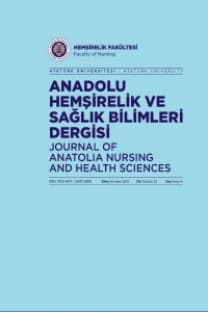Kemoterapi Alan Meme Kanseri Tanılı Hastaların Sorunları ve İhtiyacı Üzerine Niteliksel Bir Çalışma
meme kanseri, kemoterapi, niteliksel araştırma, yan etkiler
A QUALITATIVE STUDY ON THE PROBLEMS AND NEEDS OF PATIENTS WITH BREAST CANCER DIAGNOSED WITH CHEMOTHERAPY
breast cancer, chemotherapy, qualitative research, side effects,
___
- 1. Sevinc Aİ. Erken evre meme kanserinde tedavi seçenekleri. In: Aydın S, Akca T, editors. Tüm yönleri ile meme kanseri. Nobel Tıp Kitabevi 2011; 273–88.
- 2. Arslan C, Dizdar Ö, Altundag K. Chemotherapy options in breast cancer. In: Aydın S, Akca T, editors. Breast cancer in all aspects. Nobel Tıp Kitabevi 2011; 347-57.
- 3. Chan HK, Ismail S. Side effects of chemotherapy among cancer patients in a malaysian general hospital: experiences, perceptions and informational needs from clinical pharmacists. Asian Pacific Journal of Cancer Prevention 2014; 15(13): 5305-9.
- 4. Yesilbalkan OU, Akyol AD, Cetinkaya Y, Altın T, Unlu D. Studying the symptoms that are being experienced due to treatment by the patients who receive chemotheraphy and theır effects on the quality of life. Ege Universitesi Hemsirelik Yuksek Okulu Dergisi EUHYO 2005; 21(1): 13- 31.
- 5. Baskale H, Sercekus P, Gunusen N. Investigation of cancer patients’information sources, information needs and expectations of health professionals. Journal of Psychiatric Nursing 2015; 6(2): 65-70.
- 6. Lei CP, Har YC, Abdullah KL. Informational needs of breast cancer patients on chemotherapy: differences between patients' and nurses' perceptions. Asian Pacific Journal of Cancer Prevention 2011; 12: 797-802.
- 7. Yi M, Cho J, Noh DY, Song MR, Lee JL, Juon HS. Informational needs of Korean women with breast cancer: Cross–cultural adaptation of the Toronto informational needs questionnaire of breast. Asian Nursing Research 2007; 1(3): 176- 86.
- 8. Aslan O, Vural H, Komurcu S, Ozet A. Effect of education on chemotherapy symptoms in cancer patients receiving chemotherapy. C.U. Hemsirelik Yuksekokulu Dergisi 2006; 10(1): 15-28.
- 9. Akcay D, Gozom S. Evaluation of the effect of education of chemotherapy side effects and home follow-up on the quality of life in patients with breast cancer given chemotherapy. The Journal of Breast Health 2012; 8(4): 191-9.
- 10. Aslam MS, Naveed S, Ahmed A, Abbas Z, Gull I, Athar MA. Side effects of chemotherapy in cancer patients and evaluation of patients opinion about starvation based differential chemotherapy. Journal of Cancer Therapy 2014; 5: 817-22.
- 11. Spichiger E, Rieder E, Müller-Fröhlich Ch, Kesselring A. Fatigue in patients undergoing chemotherapy, their self-care and the role of health professionals: A qualitative study. European Journal of Oncology Nursing 2012; 16: 165-71.
- 12. Siefert ML. Fatigue, Pain, and Functional Status During Outpatient Chemotherapy. Oncology Nursing Forum 2010; 37(2): 114-23.
- 13. Gregurek R, Bras M, Dordevic V, Ratkovic AS, Brajkovic L. Psychological problems of patients with cancer. Psychiatr Danub 2010; 22(2): 227-30.
- 14. Boehmke MM, Dickerson SS. Symptom, symptom experiences, and symptom distress encountered by women with breast cancer undergoing current treatment modalities. Cancer Nursing 2005; 28(5): 382-9.
- 15. Lemieux J, Maunsell E, Provencher L. Chemotherapy-induced alopecia and effects on quality of life among women with breast cancer: a literature review. Psycho-Oncology 2008; 17: 317-28.
- 16. Irmak MK, Bilgin MG, Sızlan A. Cancer from the Perspective of Patients. TSK Koruyucu Hekimlik Bulteni 2008; 7(2): 167-72.
- 17. Helms RL, Erin L, O’hea EL, Corsa M. Body image issues in women with breast cancer. Psychology, health & medicine 2008; 13(3): 313- 25.
- 18. Rosman S. Cancer and stigma: experience of patients with chemotherapy-induced alopecia. Patient Education and Counseling 2004; 52(3): 333-9.
- 19. Lavin M, Hyde A. Sexuality as an aspect of nursing care for women receiving chemotherapy for breast cancer in an Irish context. European Journal of Oncology Nursing 2006; 10(1): 10-8.
- 20. Aygın D, Eti Aslan F. A study of sexual dysfunction in women with breast cancer. The Journal of Breast Health 2008; 4(2): 105–14.
- 21. Atesci FC, Oguzhanoglu NK, Baltalarlı B, Karadag F, Ozdel O, Karagoz N. Psychiatric disorders in cancer patients and associated factors. Turk Psikiyatri Dergisi 2003; 14(2): 145–52.
- 22. Lee YM, Francis K, Walker J, Lee SM. What are the information needs of Chinese breast cancer patients receiving chemotherapy? European Journal of Oncology Nursing 2004; 8: 224–33
- ISSN: 1309-5471
- Yayın Aralığı: Yılda 4 Sayı
- Yayıncı: Atatürk Üniversitesi Hemşirelik Fakültesi
DOĞUM SÜRECİNDE YAPILAN VAJİNAL MUAYENEYE İLİŞKİN ANNELERİN GÖRÜŞLERİ
Şengül DOLU KUBİLAY, Seher ERGÜNEY
EMZİRME EĞİTİMİNDE ÖĞRENDİĞİNİ ANLAT (TEACH-BACK) YÖNTEMİNİN KULLANIMI
Arzu KUL UÇTU, Nebahat ÖZERDOĞAN
“AMELİYATHANE HEMŞİRESİ OLMAK”: NİTEL BİR ÇALIŞMA
Betül AKALIN, Ayşenur MODANLIOĞLU
Ferhat GÜNERİGÖK, Fatma YILMAZ KURT, Sibel KÜÇÜKOĞLU
DÜŞÜK MOLEKÜL AĞIRLIKLI HEPARİN UYGULAMASI
PİLONİDAL SİNÜS AMELİYATI SONRASI FARKLI YATIŞ POZİSYONUNUN DRENAJ MİKTARI ÜZERİNE ETKİSİ
Zeynep KARAMAN ÖZLÜ, Vesile ESKİCİ, İbrahim ÖZLÜ, Ayşegül YAYLA, Turgut ŞÖHRET, Meryem YAVUZ VAN GIERSBERGEN, Gamze KURT
Serap Topatan, Şengül KAHRAMAN
TÜRKİYE’DEKİ TEZLERDE DOĞUM AĞRISININ YÖNETİMİNDE KULLANILAN NONFARMAKOLOJİK YÖNTEMLERİN İNCELENMESİ
